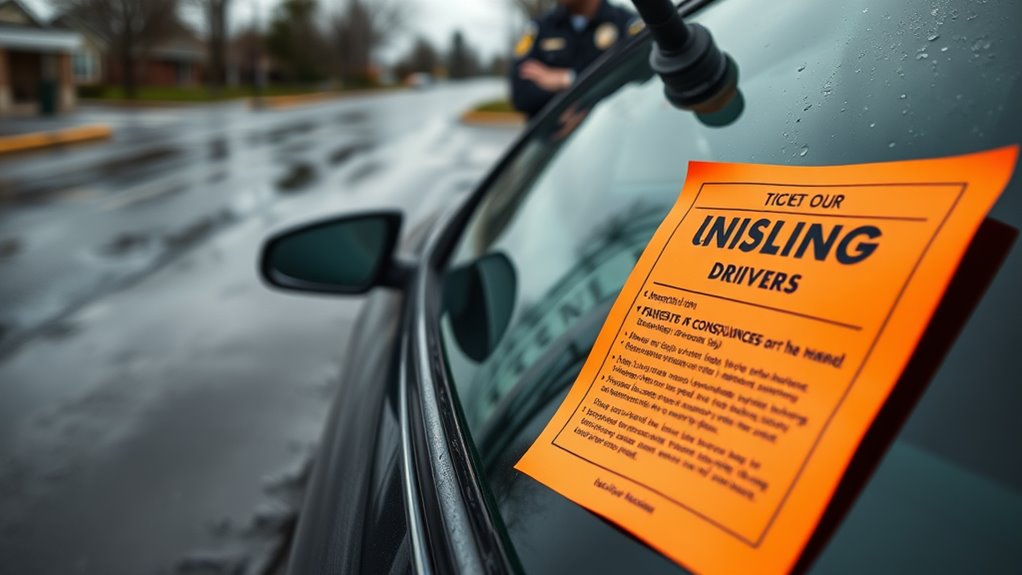Driving without insurance in Ohio can lead to some rather eye-opening consequences. While many may view it as a minor oversight, the reality is that the repercussions are far-reaching. From facing escalating fines to potential license suspension, the stakes are high. Furthermore, the financial and legal implications can haunt you long after the initial incident. Understanding these consequences is essential for anyone considering the risks of being uninsured.
Key Takeaways
- Uninsured drivers face initial fines starting at $100, escalating to $600 for repeat offenses, creating significant financial burdens.
- License suspensions can occur for uninsured driving, with first offenses leading to up to 90 days of lost driving privileges.
- Driving without insurance increases personal liability for all damages in an accident, risking financial strain and potential civil lawsuits.
- High-risk classification from uninsured status complicates future insurance acquisition, leading to higher premiums and reduced coverage options.
- Unpaid debts from accidents can result in wage garnishments or property liens, severely impacting financial stability and credit scores.
Fines and Penalties for Uninsured Drivers

When you drive uninsured in Ohio, you'll face significant fines and penalties that can escalate quickly with repeated offenses.
Initially, a $100 fine is imposed for the first offense, but this increases substantially for subsequent violations, reaching up to $600 for the third offense. If you fail to surrender required documents, a non-compliance fee of $50 applies, alongside a potential $10 service fee based on your payment method. Additionally, repeat offenders may experience vehicle immobilization or even confiscation. The financial repercussions don't end there; out-of-pocket expenses for accidents can lead to civil lawsuits, adding to your financial burden. This is particularly concerning given that over one million uninsured drivers are currently on the road in Ohio, highlighting the risks of driving without insurance. Furthermore, Ohio mandates SR-22 insurance for certain offenders, which can serve as a reminder of the serious consequences of driving uninsured.
License Suspension and Its Implications
Driving without insurance in Ohio can lead to a license suspension, which affects not only your driving privileges but also your vehicle registration. This suspension can occur without any traffic violation or accident.
For first-time offenders, the suspension lasts up to 90 days, while repeat offenses within five years can extend this period greatly. Approximately 13% of Ohio's driver's licenses are suspended, disproportionately impacting low-income individuals, often leading to job loss and economic hardship.
Additionally, reinstatement involves fees that escalate with repeated offenses, and proof of continuous insurance is required. Violating suspension terms may result in further penalties, including vehicle confiscation.
Consequently, the implications of license suspension can severely limit your economic mobility and opportunities.
Financial Risks of Driving Without Insurance
Although many may underestimate the financial risks of driving without insurance, the potential consequences can be devastating. If you cause an accident, you're personally liable for all damages, which can lead to significant out-of-pocket expenses.
Civil lawsuits may arise, further exposing you to financial strain. Being classified as a high-risk driver complicates acquiring insurance, often resulting in higher premiums.
If you fail to pay judgments, wage garnishment or property liens may follow, straining your financial health. Additionally, unpaid debts can damage your credit score, leading to higher interest rates on future loans.
Ultimately, driving uninsured not only risks immediate financial burdens but also jeopardizes your long-term financial stability.
Legal Consequences of Uninsured Driving

Failing to maintain proper insurance coverage in Ohio can lead to severe legal ramifications that extend far beyond mere fines.
Ohio law mandates at least $25,000 in bodily injury liability per person and $25,000 for property damage. Driving uninsured results in penalties such as hefty fines, license and vehicle registration suspensions, and, in extreme cases, vehicle immobilization.
You may also face civil liability for damages caused in an accident, making you personally responsible for costs. Legal action from victims can complicate your financial situation, as collecting compensation from uninsured drivers is often difficult.
Additionally, repeated violations could lead to vehicle confiscation, emphasizing the importance of adhering to Ohio's insurance requirements.
Long-Term Effects on Insurance Accessibility
When individuals in Ohio lack insurance, they not only face immediate legal consequences but also encounter long-term challenges in accessing necessary healthcare services.
Uninsured adults are more likely to experience poorly managed chronic conditions and delayed diagnoses, leading to worse health outcomes. For you, this means increased financial strain from medical expenses and inadequate treatment.
Without a usual source of care, both adults and children struggle to meet basic health needs, including mental health support and dental care.
Additionally, socioeconomic factors play a role; lower income and education levels correlate with higher uninsured rates.
As Ohio continues to address these disparities, understanding the long-term implications of lacking insurance is essential for improving your overall health and well-being.
Conclusion
Driving without insurance in Ohio is like sailing a ship without a life raft; the risks are immense. You might navigate the waters initially, but one stormy wave—a fine, a license suspension, or a lawsuit—can capsize your financial stability. The consequences ripple outward, affecting your future insurance options and credit score. Ultimately, it's essential to secure coverage to avoid being cast adrift in turbulent waters, ensuring you stay afloat in the sea of life's uncertainties.

